| itinerary < 20 August Astoria Port Angeles, WA Hurricane > | Port Angeles, WA 21 August 2015 |
Astoria â€" Port AngelesAfter a heroic breakfast at the Rose River Inn, we dropped by the local co-op for some groceries, and then headed north across the Columbia. At this point, near the mouth, the river is over four miles wide, with a high bridge over the main southern channel, a lower bridge over the north channel connected by a sort of causeway over the shallow middle. Both channels were crawling with hundreds of little boats out after the salmon running upstream. According to Pam, the fishing this year has been the best in years. Our car's nav lady absolutely did not want us to turn west and follow Highway 101 around the western side of the Olympic Peninsula, but we persevered. The first few dozen miles runs along tidelands and lazy estuaries with frequent signs pointing uphill saying 'Tsunami Escape Route.' After South Bend, 101 crosses the 'Prairie,' a broad flat timberland. A fringe of trees has mostly been left along the roadway, but breaks in the wall reveal that this land has been heavily and repeatedly scalped. These patches of same-age timber, some nearing full height right beside short young stands, underscore the fact that this isn't really forest; it's for-profit silviculture. Nor deer, nor birds, nor open meadows relieve the thick blanket of same-species trees, proving that here in the Northwest, money does grow on trees. |
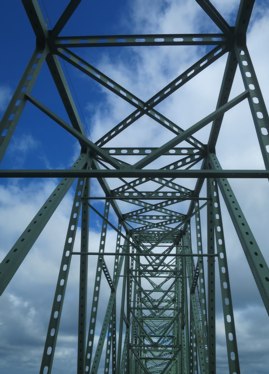 Bridge over the Mighty Columbia |
 |
|
Our route took us through Aberdeen and Hoquiam, two of the most forlorn cities one could ever hope to avoid. We needed gas, but it took two passes through town to find a functioning gas pump. The card reader couldn't understand my card, so I went inside, and an unbelievably cheerful clerk explained, 'Yes, it has mood swings.' 'Quite unlike ourselves?' I ventured, and after a second or two to process this, she laughed, and said,'Hon, we NEVER would do anything like THAT.' Towns on the dirty end of resource extraction turn ugly when the resources begin to play out. Fort Bragg was lucky to avoid that (at least to the extent that it did; we noticed zero empty storefronts in Astoria) and can probably thank tourism and retirement economy for that. Aberdeen still has plenty of trees, but the economics of cutting them isn't as simple as it was when diesel was 35 cents a gallon. Aberdeen in its heydey must have been quite a place, with dozens of stoplights and hundreds of compact little middle class houses on once-tidy lots. All's in decay now, a poster child for the death of the middle class. Traffic was much lighter today, since it takes stalwart travellers to make it past the hundred or so miles of tree farm to get to the 25 miles of exquisite coast in the Ocean Unit of Olympic National Park. Plenty of time, however, to see our daily ration of incredibly selfish driving: the pick-up truck that puts his right wheels over the edge of the roadway to block traffic behind him while he makes his leisurely left turn; the massive RV (Washington plates) that crawls past half a dozen signs telling him its illegal to delay five vehicles behind him, and half a dozen clearly labeled pull-outs to enable him to get out of the way ...while a dozen vehicles accumulate behind him. And Yes, it was a 'him.' 'Hers' don't usually drive behemoth RVs. We expect to see a lot of this, since we're on the road six or more hours a day. In fairness, we see about the same amount of bone-headed driving between Caspar and Fort Bragg. |
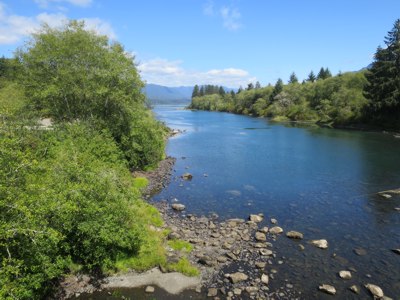 Quinault River and Lake beyond |
Mother Earth's tree-pelt gets bumpy about Lake Quinault, on the southern edge of Olympic National Park (ONP). I noticed dozens of signs 'STOP the $900 Million Land Grab.' This turns out to be a complete red herring propagated by (one presumes) timber interests. Originally, recognizing ONP's importance in the economy of northwestern Washington (3 million visitors a year), its representatives fielded a bill to expand the park by buying ecologically important parcels if and only if their owners were willing to sell -- not a bad deal in this depressed area. But the nay sayers won, the plan was withdrawn, and the edges of ONP have been saved for rapacious logging! A true Trumpian victory! Rochelle drove from Quinault. I saw a skinny coyote scamper from clearcut to clearcut a mile ahead of us, but caught no sight of him as we passed. |
|
At Queets, where the Queets River reaches the sea, 101 turns north with just a narrow fringe of storm-twisted Cedars between it and the Pacific. This is the Ocean Unit of ONP, a seldom visited bit of isolated and magnificent coast. Today was one of its Good Days, without much wind, and we got out at Beach 3, walked across the grounds of Kalaloch Lodge, and down to the stunning long beach. Piles of driftwood reveal its roughness, but today, sitting on a massive ocean-cleaned log and eating some Columbia smoked salmon, a heirloom tomato, and something called SeaSnax (made in Korea from seaweed, olive oil, and onion; yummy) we enjoyed watching a toddler experiencing his first surf, closely watched by his young mom. After lunch, back inland just after Ruby Beach, on through Forks, much more sprawling than our last visit, around Crescent Lake -- sorry, no picture -- and out to Puget Sound at Port Angeles. |
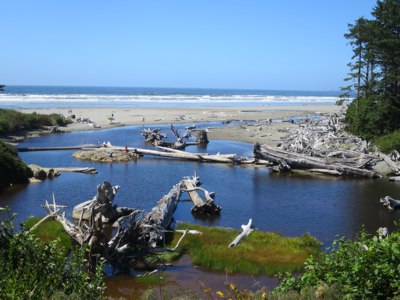 Beach 3 at Kalaloch Lodge |
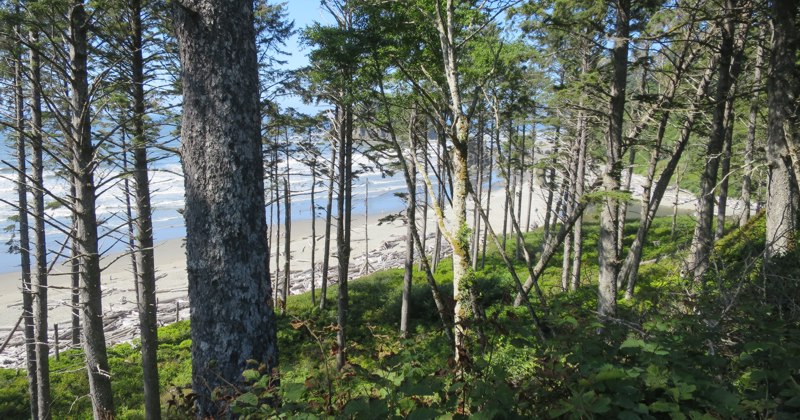 Ruby Beach at the north end of the Ocean Unit, Olympic National Park |
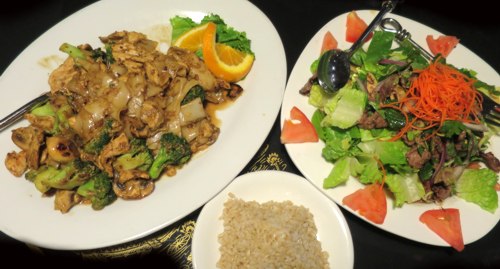 Pad See Iew (Noodles with Vegetables and Chicken) and Yum Neua (Salad with Beef) |
Dinner at Sabai ThaiNot just delicious, but instructive. Raw eggplant slices along with the whole mint leaves, galangal, and lemon grass in the Yum Neua. The salad rolls, rice paper with fresh crispy vegetables and shrimp, with a smoky ginger sauce. And this: In Thailand, our food is the central fcus of our lives. Because we believe that life should be 'sanuk' (enjoyable) and 'sabai' (comfortable and relaxed), the pleasures of relaxing and eating with friends and family are of the utmost importance to us. In virtually every aspect of our lives, from simple get-togethers to important ceremonies, our food is at the heart... Our life and business philosophy include the uniquely Thai concept of 'mai-pen-rai,' which translates as 'Don't worry, Be happy.' We feel that as long as we are cooking and creating this extraordinary culinary and cltural experience for our guests, we will accomplish our goal. |
 |
updated 18 November 2024 Caspar Time site software and photographs by the Caspar Institute except as noted this site generated with 100% recycled electrons! send website feedback to the CI webster © copyright 2002-2024 Caspar Institute |